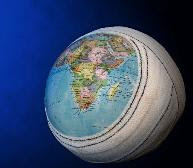 Depending on where you are, this is going to be a hotter, wetter, drier, windier, calmer, dirtier, buggier or hungrier century than mankind has seen in a while.
Depending on where you are, this is going to be a hotter, wetter, drier, windier, calmer, dirtier, buggier or hungrier century than mankind has seen in a while.
In some places, it may be deadlier, too.
The effects of climate change are diverse and sometimes contradictory.
In general, they favor instability and extreme events. On balance, they will tend to harm health rather than promote it.
That is the majority view of scientists trying to solve an equation whose variables range from greenhouse gas concentrations and the El Niño weather pattern to mosquito ecology and human cells' ability to withstand heat.
"We are not dealing with a single toxic agent or a single microbe where we can put our finger with certainty on an exposure and the response," said Jonathan A. Patz, a physician and epidemiologist at the University of Wisconsin at Madison. "Climate change affects everything."
Predictions of how global warming could affect people's health are crude.
They are based on the experience of the past several decades, when there has been a small, well-documented rise in the temperatures of the planet's atmosphere and oceans.
What that says about the future and future health care is quite uncertain.
In the last quarter of the 20th century, the average atmospheric temperature rose by about 1 degree Fahrenheit.
By 2000, that increase was responsible for the annual loss of about 160,000 lives and the loss of 5.5 million years of healthy life, according to estimates by the World Health Organization. The toll is expected to double to about 300,000 lives and 11 million years of healthy life by 2020.
Read the full story here


No comments:
Post a Comment